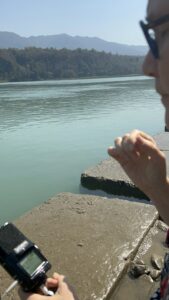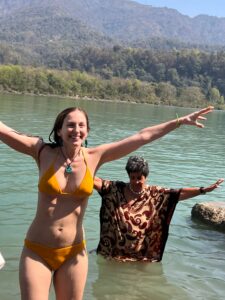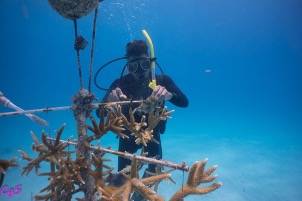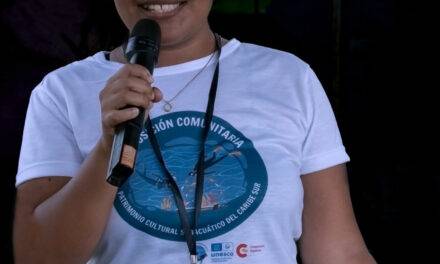
By María Suárez Toro,
Escribana and Feminist International
Radio Endeavour (FIRE/RIF)
March 6, 2023
“The pedagogy of the waters is a profound encounter of nature’s life through its waters” (Tona Ina)
On Monday, FIRE/RIF broadcast on digital radio from the bottom of the Ganges River in northern India, using an eco-media innovation consisting of an underwater hydrophone (microphone).
Photo: Ría recording in the
Ganges River in India.
It became part of the “Pedagogy of Waters”, pedagogy being designed and constructed by myself and Colombian drummer from “Tocá Tambó” in Costa Rica, Anyúl Arévalo. It seeks to express the voice of the waters of the planet through the artistic expression of the experience of the young generation of children and adolescents of coastal marine communities in Costa Rica and elsewhere evetually.
It is based on a combination of the methodology of Paolo Freire (social consciousness) with that of Maria Montessori (natural science) to promote the awareness and symbiotic experience of the human species with waters of the oceans.
Through this new experience of FIRE/RIF transmitting the eco-media expression of the waters, the waters acquire their own voice without mediation, except for the hydrophone that we submerged in the river so that it would speak to us.
The trip in India to meet the river, had already said a lot (see video by RIF/FIRE), but its voice from its depths surpassed all previous experiences.
Through the hydrophone, we could hear the subtle voice of the water; the slow rhythm of the creatures (little fish, snails and crabs that day) trying to avoid the unbridled current of the river itself; the sound of the birds that swooped down to the water to drink; and – to top it off – the sound vibrations of the sacred songs of the Hindi culture that could be heard along the sacred river for the celebration of the sunset and commemoration of Holee on March 8th.
We plunged into the river waters with great reverence and caution, serenaded by the sounds of Penelope’s guitar, to embrace each other with the life of the river, to feel its currents run through the veins of our cold bodies and even to warm each other.

This experience suggests that the Pedagogy of Water can contribute to complete the vital circuit of our nature: remembering, knowing and feeling ourselves as part of nature when we allow it to speak to us and we listen to it carefully.
Listening to the waters of the river and feeling those who live in its ecosystem irremediably connects us to the waters throughout the planet.
Penelope and I in the waters after the broadcast.
If in 2022 the South Caribbean Sea Festival managed to express let the sea express itself through drawings, songs, murals, floats and stories by children and youth has been a tremendous wealth, with this experience of underwater transmission in 2023, the “Pedagogy of the Waters” has enabled the waters speak to us with their own voice as well.
The FIRE/RIF transmission relied on technology and the work of Australian activist and lawyer Ría Jago, currently completing a PhD at the Sunshine Coast University in her country. Ría explores dimensions of cosmogonic nature that must be known in times of ecological disintegration due to the disasters caused by the dissociation of the human species on the planet. “It is not only what is heard, but the very act of patiently listening to the river and allowing oneself to be influenced – Ría tells me as she throws her microphone into the water – it is the subtle interaction that moves.”
Participating in the broadcast on the Ganges that day were her sister Hellen Mac Cosker from regenerative agriculture in Australia, Italian culinary baker Penelope Spica, Italian poet Franziska Kaufmann, journalist Nicoletta Dentico from Italy, and foodie environmentalist Samantha de Lucena Caldato from Brazil.
The FIRE/RIF team participated with me in cybernetic outer space: the Chilean lawyer and communicator Katerina Anfossi, the Cuban radio station producer Yarman Jiménez and the journalist and communication professor Margaret Thompson.
The broadcast was sponored by Genevieve Vaughan and the Maternal Gift Economy Movement.



